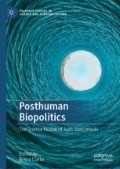Abstract
Derek J. Thiess studies connections among material history, place, and human embodiment in Slonczewski’s microbe novels. The children of Children Star that become the micros of Brain Plague represent the physical consequences of pure social construction. These novels provide a cautionary demonstration that the revision of history necessarily involves the destruction of competing histories, not only by revision, but also by ecocide, the destruction of a historical place and of the humans who embody their own lived histories. Slonczewski’s work explores the social construction of race and gender but still allows for a critical intervention that is sensitive to the embodied, physical limits and consequences of relativist and constructivist approaches in our critical considerations.
Access this chapter
Tax calculation will be finalised at checkout
Purchases are for personal use only
References
Agamben, Giorgio. 2004. The Open: Man and Animal. Trans. Kevin Attell. Stanford: Stanford University Press.
Allen, Katherine R., and Alexis J. Walker. 2006. Aging and Gender in Families: A Very Grand Opening. In Age Matters! Realigning Feminist Thinking, ed. Toni M. Calasanti and Kathleen F. Slevin, 155–74. New York: Routledge.
Attebery, Brian. 2002. Decoding Gender in Science Fiction. New York: Routledge.
Best, Amy L. 2007. Introduction. In Representing Youth: Methodological Issues in Critical Youth Studies, ed. Amy L. Best, 1–36. New York: New York University Press.
Bollinger, Laurel. 2010. Symbiogenesis, Selfhood, and Science Fiction. Science Fiction Studies 37 (1): 34–53.
Butler, Judith. 1993. Bodies That Matter: On the Discursive Limits of “Sex”. New York: Routledge.
Butter, Michael. 2009. The Epitome of Evil: Hitler in American Fiction, 1939–2002. New York: Palgrave Macmillan.
Calasanti, Toni M., and Kathleen F. Slevin, eds. 2006a. Age Matters!: Realigning Feminist Thinking. New York: Routledge.
———. 2006b. Introduction: Age Matters. In Age Matters! Realigning Feminist Thinking, 1–17. New York: Routledge.
Csicsery-Ronay Jr., Istvan. 2008. The Seven Beauties of Science Fiction. Middletown: Wesleyan University Press.
Gomel, Elana. 2014. Narrative Space and Time: Representing Impossible Topologies in Literature. New York: Routledge.
Hellekson, Karen. 2001. The Alternate History: Refiguring Historical Time. Kent: Kent State University Press.
Hills, Matt. 2009. Time, Possible Worlds, and Counterfactuals. In The Routledge Companion to Science Fiction, ed. Mark Bould, Andrew M. Butler, Adam Roberts, and Sherryl Vint, 433–41. New York: Routledge.
Hughes-Warrington, Marnie. 2013. Revisionist Histories. New York: Routledge.
Foucault, Michel. 1990. The History of Sexuality, Volume One: An Introduction. Trans. Robert Hurley. New York: Vintage.
Laz, Cheryl. 2003. Age Embodied. Journal of Aging Studies 17 (4): 503–19.
Le Guin, Ursula K. 1973. The Ones Who Walk Away from Omelas. In The Wind’s Twelve Quarters, ed. Ursula K. Le Guin, 275–84. New York: Harper and Row.
Lehtonen, Sarah. 2013. Girls Transforming: Invisibility and Age-Shifting in Children’s Fantasy Fiction Since the 1970s. Jefferson, NC: McFarland.
Marshall, Barbara L., and Stephen Katz. 2006. From Androgyny to Androgens: Resexing the Aging Body. In Age Matters! Realigning Feminist Thinking, ed. Toni M. Calasanti and Kathleen F. Slevin, 75–97. New York: Routledge.
Rabkin, Eric S. 1996. Introduction: Immortality: The Self-Defeating Fantasy. In Immortal Engines: Life Extension and Immortality in Science Fiction and Fantasy, ed. Gary Westfahl, George Slussar, and Eric S. Rabkin, ix–xvii. Athens: University of Georgia Press.
Roberts, Robin. 1990. Postmodernism and Feminist Science Fiction. Science Fiction Studies 17 (2): 136–52.
Scarry, Elaine. 1985. The Body in Pain: The Making and Unmaking of the World. Oxford: Oxford University Press.
Slonczewski, Joan. 1986. A Door into Ocean. New York: Orb/Tor, 2000.
———. 1993. Daughter of Elysium. Rockville, MD: Phoenix Pick, 2010.
———. 1998. The Children Star. New York: Tor.
———. 2000. Brain Plague. Rockville, MD: Phoenix Pick, 2010.
Southgate, Beverley. 2009. History Meets Fiction. London: Longman Pearson.
Thiess, Derek J. 2014. Relativism, Alternate History, and the Forgetful Reader: Reading Science Fiction and Historiography. Lanham, MD: Lexington.
———. 2015. Embodying Gender and Age in Speculative Fiction: A Biopsychosocial Approach. New York: Routledge.
Vint, Sherryl. 2010. Animal Studies in the Era of Biopower. Science Fiction Studies 37 (3, November): 444–55.
———. 2007. Bodies of Tomorrow: Technology, Subjectivity, Science Fiction. Toronto: University of Toronto Press, 2010.
Wolmark, Jenny. 2005. Time and Identity in Feminist Science Fiction. In A Companion to Science Fiction, ed. David Seed, 156–70. Malden, MA: Blackwell.
Yaszek, Lisa. 2009. Cultural History. In The Routledge Companion to Science Fiction, ed. Mark Bould, Andrew M. Butler, Adam Roberts, and Sherryl Vint, 194–203. New York: Routledge.
Author information
Authors and Affiliations
Editor information
Editors and Affiliations
Rights and permissions
Copyright information
© 2020 The Author(s)
About this chapter
Cite this chapter
Thiess, D.J. (2020). Bodies That Remember: History and Age in The Children Star and Brain Plague. In: Clarke, B. (eds) Posthuman Biopolitics. Palgrave Studies in Science and Popular Culture. Palgrave Macmillan, Cham. https://doi.org/10.1007/978-3-030-36486-1_5
Download citation
DOI: https://doi.org/10.1007/978-3-030-36486-1_5
Published:
Publisher Name: Palgrave Macmillan, Cham
Print ISBN: 978-3-030-36485-4
Online ISBN: 978-3-030-36486-1
eBook Packages: Literature, Cultural and Media StudiesLiterature, Cultural and Media Studies (R0)

